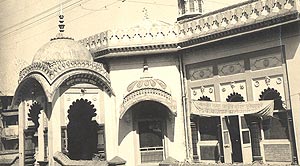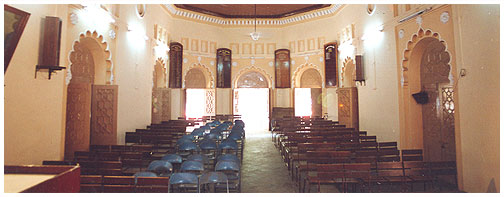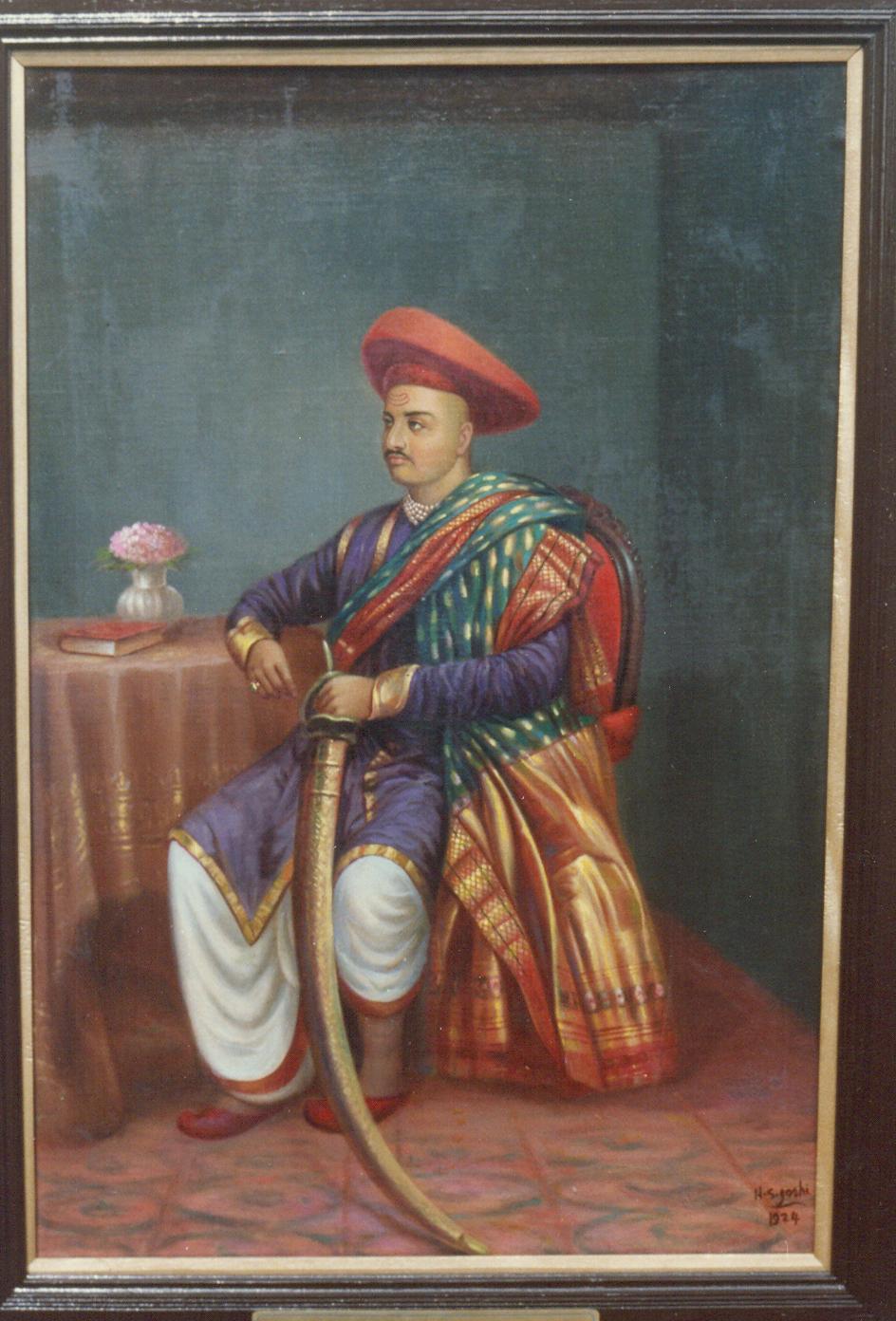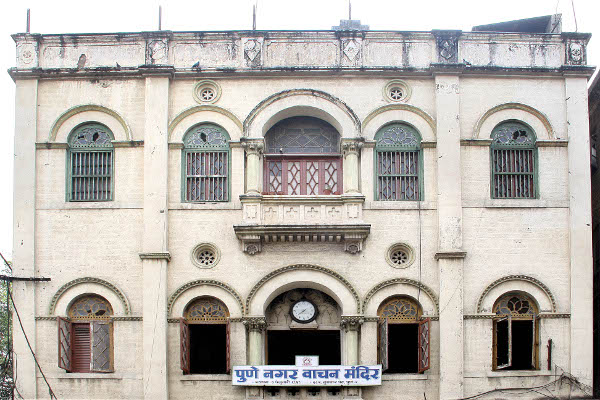Vachan Mandir - Oldest Native Libraries of Maharashtra
Written by : Edited by Amita Roy
Dated: January 18,2018
Share

Karveer Nagar Vachan Mandir, Kolhapur. Photo - Karveer Nagar Vachan Mandir
Vachan Mandir means 'the temple of words'. Present day Maharashtra was in parts ruled by Nizam, British Govt in Bombay Presidency and parts in the western side by various princely states and their aristocracies or jagirs. To encourage the spread of education, the rulers of these princely states, their aristocracies and noted personalities of the era established libraries or Vachan Mandir. Some of the oldest ones are still surviving today since the mid 19th century. They are literally the carriers of our past, present and entering the future. Let us check about some of the noted existing ones --
KARVEER NAGAR VACHAN MANDIR

Karveer Nagar Vachan Nagar is located in Kolhapur and is about 157 years old. It was established by Maharaja of Kolhapur. At the time of inception, the library had 17 members with a monthly income of Rs. 15/- & collection of 442 books. Over these years the library has gone through many transitions, through the turbulent periods of pre-independence. On 4th May 1924 it became Kolhapur General Library & on 24th May, 1934 it has acquired its present name i.e. Karveer Nagar Wachan Mandir. It has a unique distinction of having a beautiful premises built in 1881, which is identified as heritage building. It also has the enviable fortune of arranging the lecture of Swami Vivekanand in oct. 1892, which is followed by a number of dignitaries and learned towering personalities of the past. These include noted novelist N. S. Phadke, who was the president of the Library. Eminent personalities like Late Bhaskarrao Jadhav, Educationist Late Annasaheb Latthe, Prof. D. S. Pangu, Late V. S. Khandekar, eminent Marathi poet Madhav Julian were also associated with the library. With their active participation & guidance, the library survived & flourished to its present stature.
URL - www.kanawa.in
APTE VACHAN MANDIR
.jpg)
 Shrimant Govindrao Abasaheb
Shrimant Govindrao Abasaheb
.jpg) Adv.Rambhau Apte
Adv.Rambhau Apte
History of Apte Wachan Mandir dates back to the year 1870 when it was established. Rambhau Apte, an enthusiastic social worker and local pleader offered his personal collection of books and also part of his own residence to start the library under the name of Native General Library.
Shrimant Govindrao Abasaheb, the Chief of erstwhile Princely State of Ichalkaranji was generous in helping the library in its nascent stage. A separate room in Nagarkhana Building near Magdum Peer was provided for library. Soon the increased activities of library necessitated a larger place. Rambhau purchased a piece of land and started construction of building for the library. He expired in 1876 before completion of building. It was completed by Shrimant Narayanrao Babashab who had ascended the throne after the untimely demise of Shrimant Govindrao. Sadashivrao Apte, son of Rambhau handed over the building to the library and was named as Apte Wachan Mandir in acknowledgement of yeomen services rendered by late Rambhau Apte. It was officially christened name as Apte Wachan Mandir at a formal handover ceremony in 1910.
It is to the sole credit of Shrimant Narayanrao that during his long tenure of 50 years, a small sleepy town of Ichalkaranji transformed into an industrial city and Apte Wachan Mandir, a modest library attained a status of Taluka Library as a great place harnessing the qualities of readership. Many eminent personalities like historians V.K. Rajwade, Vasudershastri Khare, litérateurs N. C. Kelkar, Maharshi Karve, R. P. Paranjape, D. V. Potdar were all praise for the rich collection of rare books, manuscripts meticulously preserved over the years.
After independence, ownership of library building was taken over by the Government of Bombay.
On 1st March 1949, Ichalkaranji State was merged in Union of India. In absence of any documentary evidence, the library building was taken over by the State Government.
URL - www.aptewachan.org
PUNE NAGAR VACHAN MANDIR

Historical Pune is well known as a seat of Maratha Empire & also a beehive of intellectuals from almost all disciplines from 16 th century onwards.In 1818 the end of Peshwa regime & the beginning of British East India Company,upto 1860 was a period of twilight & transition in all aspects of society viz.economics, trade& commerce, employment,education,social hierarchy etc.This induced a need amongst the new rulers i.e. British Administration to induct modern education & modern governance.As a result,Sir George Clark, the Governor of Bombay ordered the Judge Henry Braun of Bombay to establish a library at Poona to benefit the natives.Hence with the help of eminent scholars & gentlemen of social recognition from Poona established a library named Poona Native General Library at Budhwar Wada of Peshwas on February 7,1848 i.e. Magha Shuddha 3,Saka 1769 Plavang nam.This is present day’s Pune City General Library at Belbaug Chowk,Laxmi Road,Pune at House No.181.
In establishing the library,eminent personalities namely Justice Mahadeo Govind Ranade,Lokhitvadi Gopalrao Hari Deshmukh,Krishnashatri Chiploonkar, Prof.Kero Laxman Chhatre,Daji Neelkanth Nagarkar,Vishnu Parshuram Ranade,Sonya Bapu Mande,Vishnu Moreshwar Bhide & others took whole hearted efforts with toil & money.
The library NGL at Budhwar Wada was destroyed by an incendiary on the night of May 18,1879.Poona Arbitration Court provided temporary accommodation of the library.The library changed two places upto April 1889.With the efforts of Justice Ranade & other associates & supporters of the library purchased the present place from Belbagkar Raosaheb Madhav Ballal Phadnis & constructed two storied building through Kanitkar contractors.the new building opened on July 30,1889 at the hands of His Excellency Donald James Mackay Reay Governor of Bombay.
URL -- www.punenagarvachan.org
THANE NAGAR WACHAN MANDIR
.jpg)
This library was established in 1882 and was known as the Mulock Library. Later in January 1965, it was re-named as the Thane Nagar Wachan Mandir. It aims at developing a taste for good literature among the people in the district by providing books and periodicals. It also organises lectures by eminent scholars.
